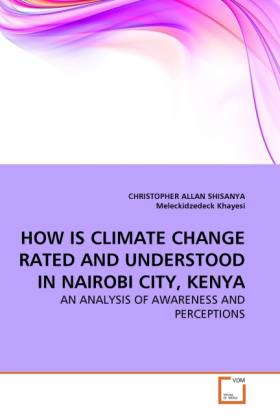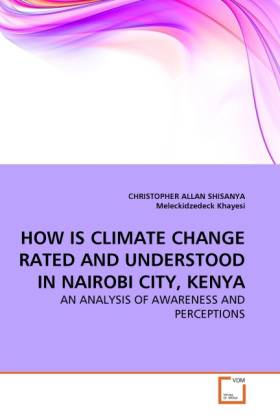
- Afhalen na 1 uur in een winkel met voorraad
- Gratis thuislevering in België vanaf € 30
- Ruim aanbod met 7 miljoen producten
- Afhalen na 1 uur in een winkel met voorraad
- Gratis thuislevering in België vanaf € 30
- Ruim aanbod met 7 miljoen producten
Zoeken
How Is Climate Change Rated and Understood in Nairobi City, Kenya
AN ANALYSIS OF AWARENESS AND PERCEPTIONS
Christopher Allan Shisanya, Meleckidzedeck Khayesi
Paperback | Engels
€ 48,45
+ 96 punten
Omschrijving
Climate change is one of the multiple contemporary environmental and development problems that human societies, including policy makers, have to respond to. Global level negotiations and programmes in climate are important but there is a need to translate them into operational plans of actions and actual activities at local country and urban level. An understanding of the perception of the seriousness of the problem of climate change is important in the overall programme of developing and initiating interventions at both local and global levels. This book provides an analysis of the perception of climate change in the city of Nairobi, Kenya. The book examines knowledge of respondents on climate change as well as their rating of climate change in relation to other environmental and development problems facing the city of Nairobi. The book also provides findings on the views of respondents on the role of the El-Niño rainfall experienced in October 1997-January 1998 in destruction of transport of infrastructure in Kenya.
Specificaties
Betrokkenen
- Auteur(s):
- Uitgeverij:
Inhoud
- Aantal bladzijden:
- 96
- Taal:
- Engels
Eigenschappen
- Productcode (EAN):
- 9783639259544
- Verschijningsdatum:
- 23/06/2010
- Uitvoering:
- Paperback
- Formaat:
- Trade paperback (VS)
- Afmetingen:
- 152 mm x 229 mm
- Gewicht:
- 149 g

Alleen bij Standaard Boekhandel
+ 96 punten op je klantenkaart van Standaard Boekhandel
Beoordelingen
We publiceren alleen reviews die voldoen aan de voorwaarden voor reviews. Bekijk onze voorwaarden voor reviews.











